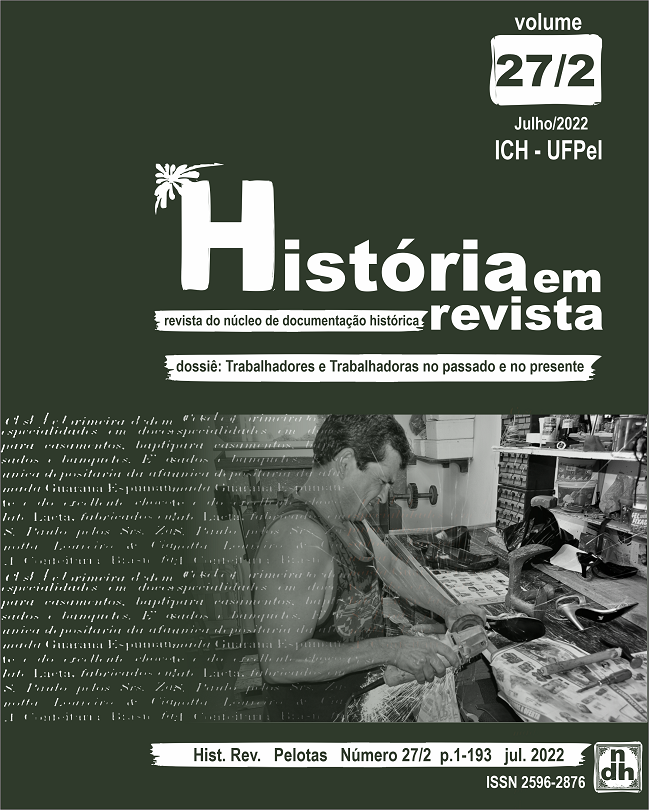“MAÇAROCA” DESIGUAL: A LUTA DAS TECELÃS DA COMPANHIA FIAÇÃO E TECIDOS PELOTENSE PELA REMUNERAÇÃO ESTABELECIDA POR LEI NA DÉCADA DE 1940
Resumo
Unequal “maçaroca”: the struggle of the weavers of Companhia Fiação e Tecidos Pelotense for the remuneration established by law in the 1940s
Este trabalho aborda a luta das operárias da Companhia Fiação e Tecidos Pelotense na Justiça do Trabalho (JT) para receber o pagamento do salário mínimo legal. Para tanto, foram analisados os processos trabalhistas dessa fábrica constantes no acervo da Justiça do Trabalho da 4ª região sob guarda do Núcleo de Documentação Histórica da Universidade Federal de Pelotas – Prof. Beatriz Loner (NDH-UFPEL) que abarcaram os anos posteriores ao Decreto-Lei nº 2.162 de 1º de maio de 1940, que fixou os valores do salário mínimo, com intuito de perceber se houve uma apropriação da lei que estabelecia valor mínimo de remuneração por parte das trabalhadoras e se, efetivamente, a lei representou para elas algum ganho nos tribunais. A abordagem teórico-metodológica privilegia a análise documental quantitativa e qualitativa ancorada nas percepções de cotidiano e tática a partir de Certeau (2014), sob a perspectiva de gênero de Scott (1995) e da divisão sexual do trabalho de Federici (2017). A investigação revelou que a via jurídica era pouco explorada e não efetivava direitos previstos em lei.
Palavras-chave: Operárias; Justiça do Trabalho; Salário Mínimo
Abstract: This work deals with the struggle of the workers of Companhia Fiação e Fabrices Pelotense in the Labor Court (JT) to receive the payment of the legal minimum wage. To this end, the labor lawsuits of this factory contained in the collection of the Labor Court of the 4th region under the custody of the Historical Documentation Center of the Federal University of Pelotas – Prof. Beatriz Loner (NDH-UFPEL) covering the years following Decree-Law No. 2162 of May 1, 1940, which set the minimum wage values, in order to see if there was an appropriation of the law that established a minimum amount of remuneration per part of the workers and if, in fact, the law represented any gain for them in the courts. The theoretical-methodological approach privileges the quantitative and qualitative documental analysis anchored in daily and tactical perceptions from Certeau (2014), in Scott’s (1995) perspective of gender (1995), and in Frederici’s (2017) sexual division of labor. The investigation revealed that the legal route was little explored and that rights provided by law were not implemented.
Keywords: Workers woman; Work Justice; Minimum wage
Autores que publicam nesta revista concordam com os seguintes termos:
1. Autores mantém os direitos autorais e concedem à revista o direito de primeira publicação, com o trabalho simultaneamente licenciado sob a Licença Creative Commons Attribution que permite o compartilhamento do trabalho com reconhecimento da autoria e publicação inicial nesta revista.
2. Autores têm autorização para assumir contratos adicionais separadamente, para distribuição não-exclusiva da versão do trabalho publicada nesta revista (ex.: publicar em repositório institucional ou como capítulo de livro), com reconhecimento de autoria e publicação inicial nesta revista.
3. Autores têm permissão e são estimulados a publicar e distribuir seu trabalho online (ex.: em repositórios institucionais ou na sua página pessoal) a qualquer ponto antes ou durante o processo editorial, já que isso pode gerar alterações produtivas, bem como aumentar o impacto e a citação do trabalho publicado.










